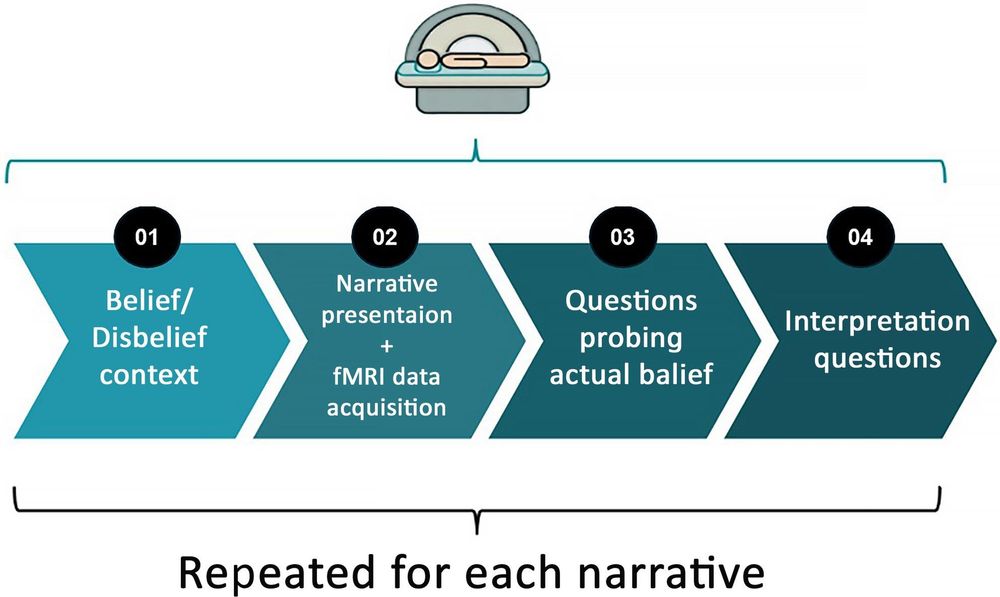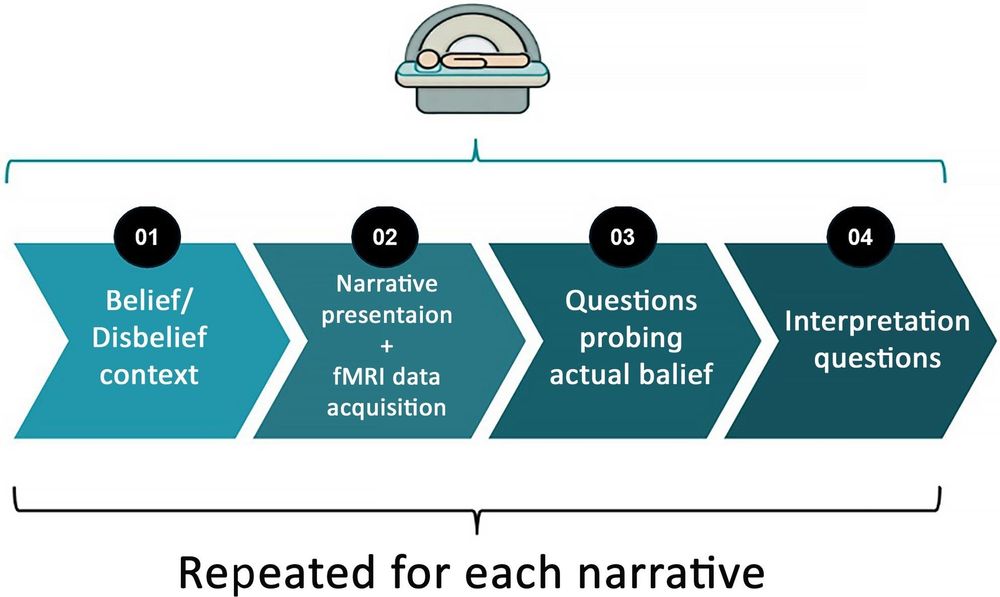🤍
09.10.2025 05:02 — 👍 0 🔁 0 💬 0 📌 0
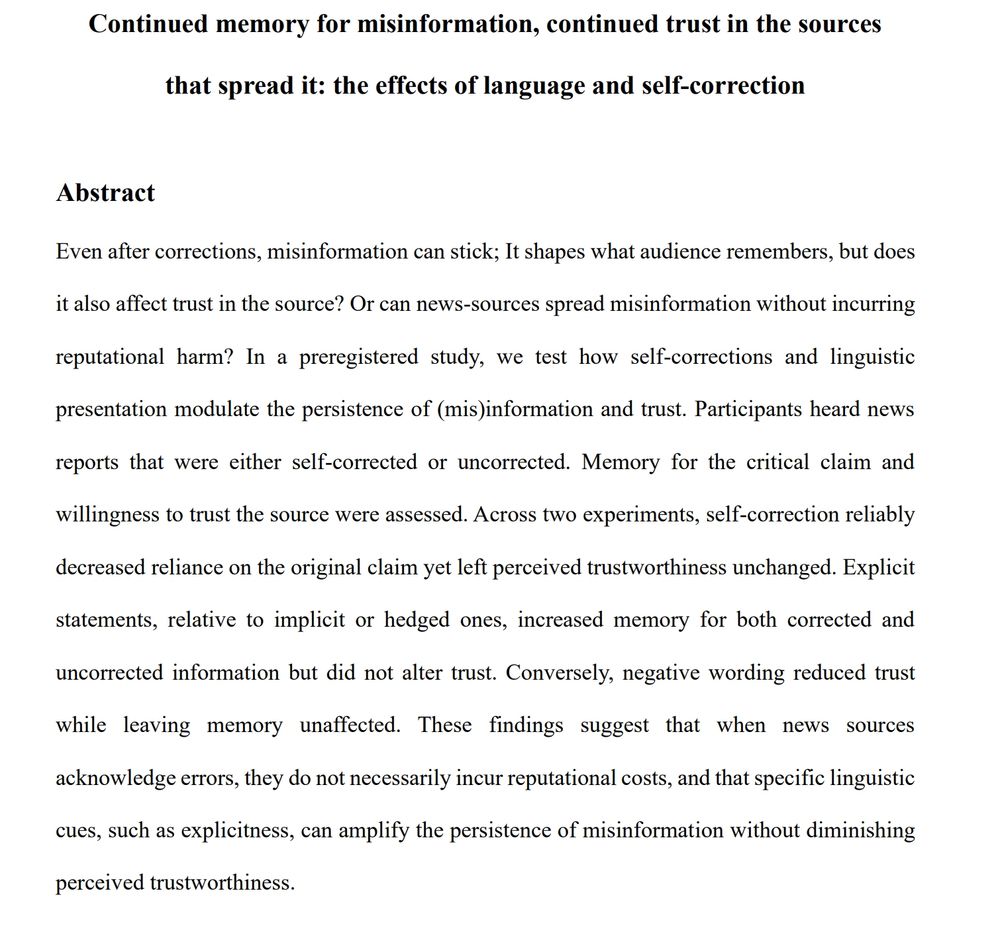
New preprint alert! 🐥
"Continued memory for misinformation, continued trust in the sources that spread it: The effects of language and self-correction".
In my completely unbiased opinion, it’s a very nice and interesting read!
Full paper at: doi.org/10.31234/osf...
15.07.2025 11:29 — 👍 2 🔁 0 💬 0 📌 0
But wont most random people (not philosophers/scientists) percieve color to be more of a physical property? I think it will be a very skewed split of responses
12.07.2025 18:59 — 👍 1 🔁 0 💬 0 📌 0
There are things similar to pain, like heat/cold. But maybe something being 'beautiful'? You can see it as your own perception or the object/scene having some kind of "physical" beautiful properties? Doesn't 100% fit, but somewhat close
12.07.2025 18:57 — 👍 0 🔁 0 💬 0 📌 0
Looks really cool. Congratz to all involved! Can't wait to read it more thoroughly :)
02.07.2025 13:46 — 👍 1 🔁 0 💬 0 📌 0
Great job and congratulations!
28.06.2025 21:12 — 👍 1 🔁 0 💬 1 📌 0
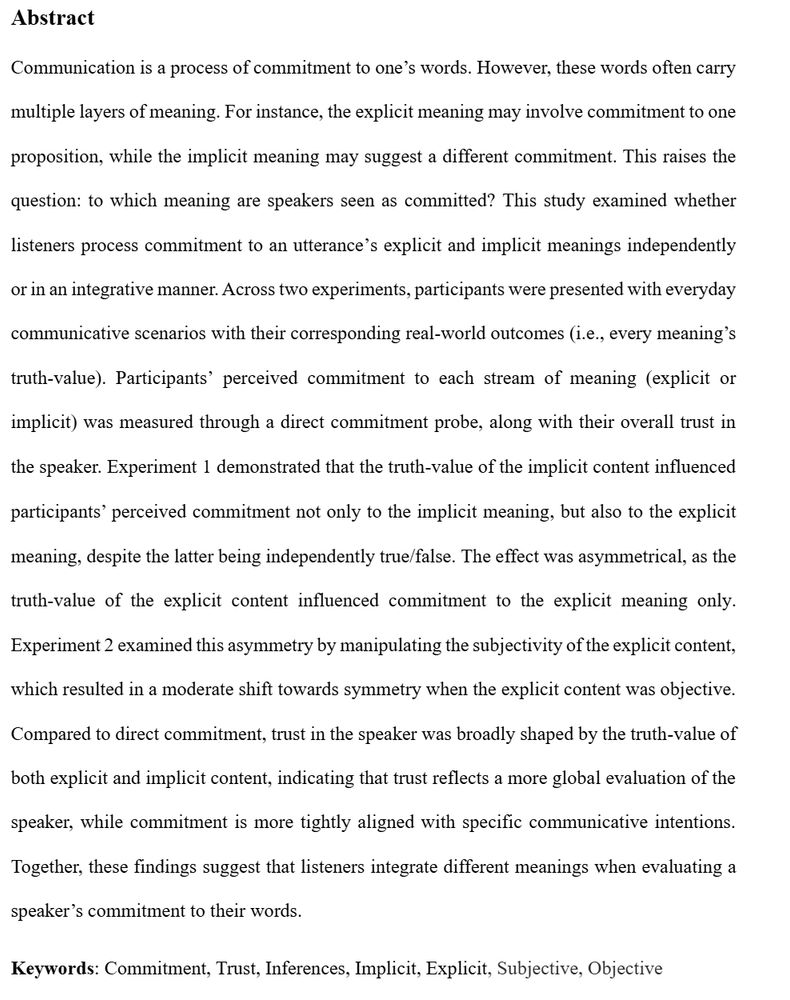
NEW preprint!
We study cases with several meanings (e.g., replying “I’m feeling sick” to “Wanna go to the beach?”). How does being truthful in one meaning, but maybe not another, shape perceived commitment to each meaning and overall trust in a speaker?
doi.org/10.31234/osf...
28.06.2025 16:26 — 👍 1 🔁 0 💬 0 📌 0
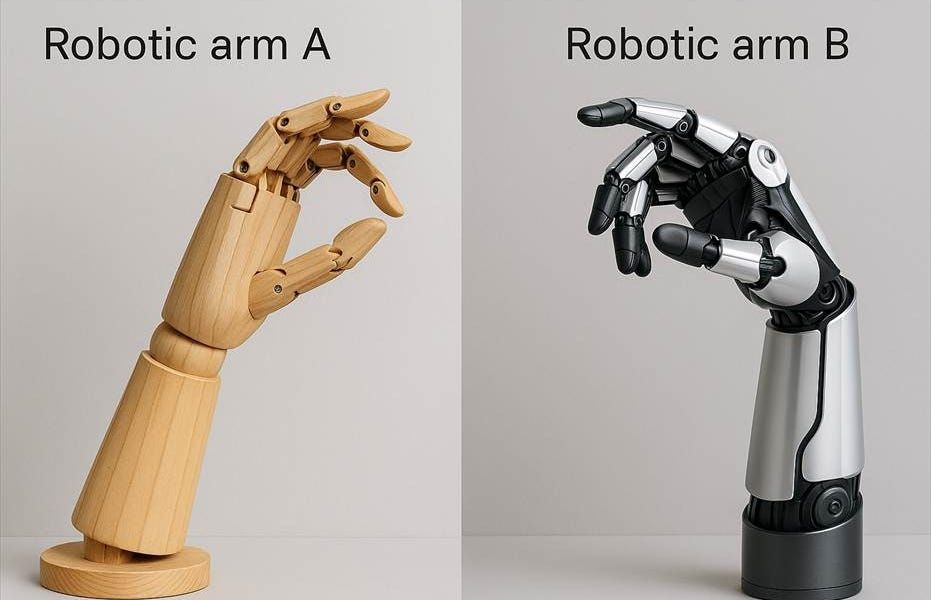
How scientific value is too often measured in dollars
In this post, I want to touch on something a bit more controversial.
Bed-bound with high fever, while now and then having to run to a shelter filled with children. So.... seems like the right time to write and share my second substack post: "How scientific value is too often measured in dollars"
open.substack.com/pub/gabrielb...
22.06.2025 18:41 — 👍 0 🔁 0 💬 0 📌 0
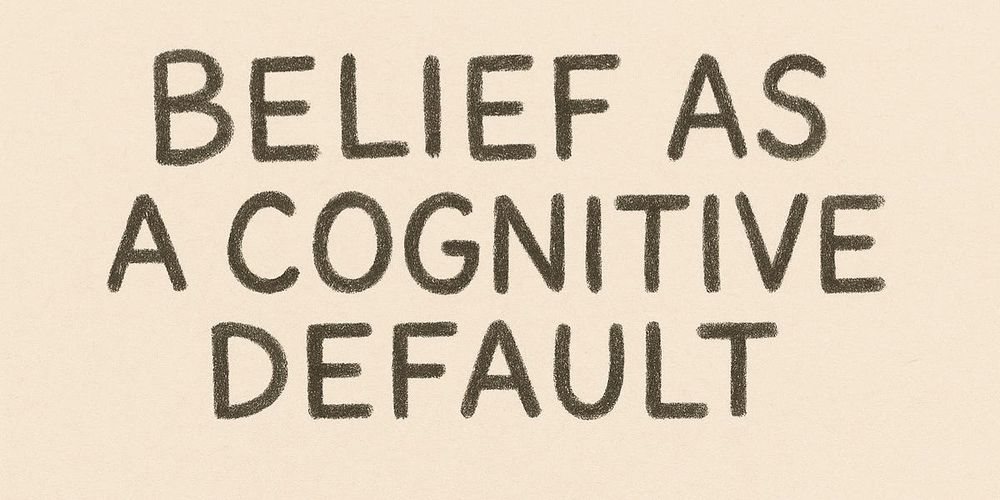
Belief as the cognitive default
Hey there!
Just me trying to write some words about belief, without having to be too formal and in APA7
open.substack.com/pub/gabrielb...
19.06.2025 15:35 — 👍 1 🔁 0 💬 0 📌 0
Neat! Congratulations and good job!
15.06.2025 20:13 — 👍 1 🔁 0 💬 0 📌 0
My intuition was: less visual imagery -> probably more 'rational' (?)-> more leaning towards deterministic views in general + anti free will views
But maybe it's just me basing it on myself (I can't even imagine my parents, they're just blobs)
15.06.2025 19:11 — 👍 2 🔁 0 💬 1 📌 0
Neat! Also happy to personally correspond with the correlation's direction
15.06.2025 18:09 — 👍 2 🔁 0 💬 1 📌 0
Together, the results show how (dis)belief shapes narrative processing. Behaviorally, belief bias supports the notion of belief as a cognitive default, while neural patterns show belief and disbelief drive distinct processing, shared across like-minded listeners. 6/6
09.06.2025 19:00 — 👍 0 🔁 0 💬 0 📌 0
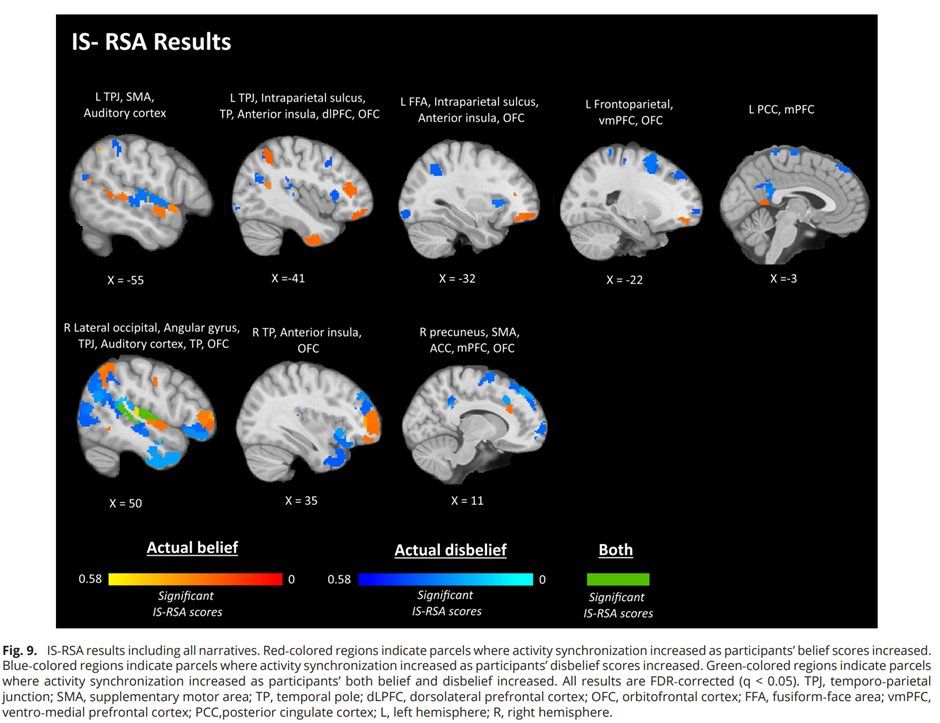
Neural synchrony associated with actual belief revealed broader patterns. High belief and high disbelief led to distinct activation patterns, which were unique to each narrative. This suggests shared interpretations shaped by how much participants believed (or disbelieved). 5/6
09.06.2025 19:00 — 👍 0 🔁 0 💬 1 📌 0
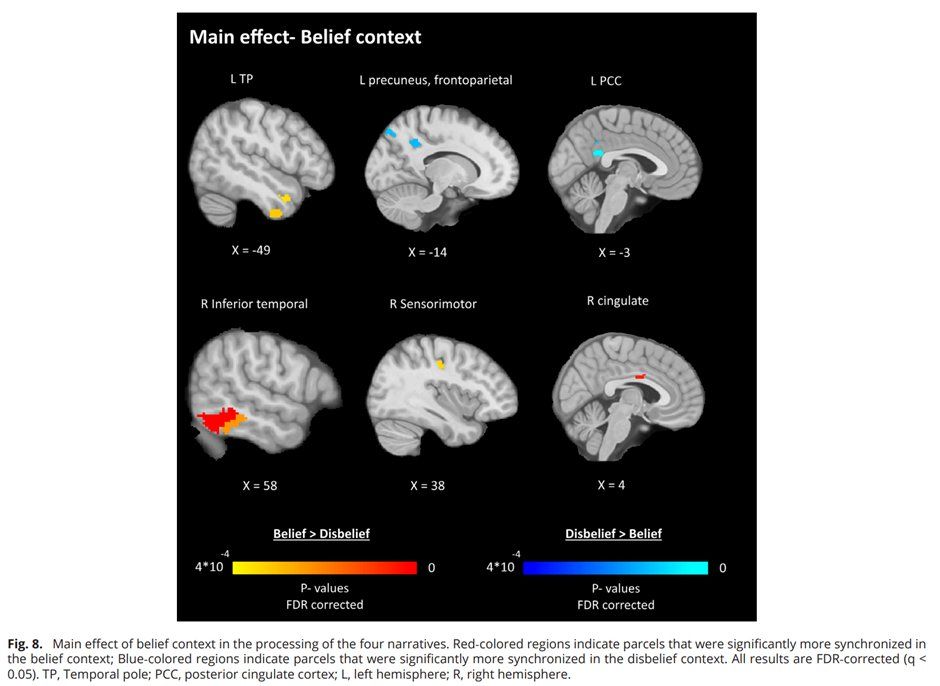
Now to brain processing: context shaped neural synchrony. Some regions synced more in belief contexts, others in disbelief, but never both. Disbelief boosted synchrony in cognitive control regions (Exp 1) + DMN (Exp 2, pic), while belief was focused in the DMN (Exp 2, pic). 4/6
09.06.2025 19:00 — 👍 0 🔁 0 💬 1 📌 0
Let’s start with behavior: did actual belief match the context? The answer was no! Even when told the witness was lying, many still chose to believe. And the mismatch wasn’t random, it consistently leaned toward belief. Some call it “truth bias,” but I prefer belief bias. 3/6
09.06.2025 19:00 — 👍 0 🔁 0 💬 1 📌 0
In practice, participants heard testimonies under belief/disbelief contexts while we scanned their brain activity. Afterward, they rated how much they actually believed the speaker. We then asked: how synchronized were their brains with others? And did belief boost synchrony? 2/6
09.06.2025 19:00 — 👍 0 🔁 0 💬 1 📌 0
How do belief and disbelief shape how the brain processes narratives? Unlike discrete facts, narratives push us to actively build interpretations. We manipulated contextual belief (told if the speaker is lying/truthful) and measured actual belief. Then looked at the brain. 1/6
09.06.2025 19:00 — 👍 0 🔁 0 💬 1 📌 0
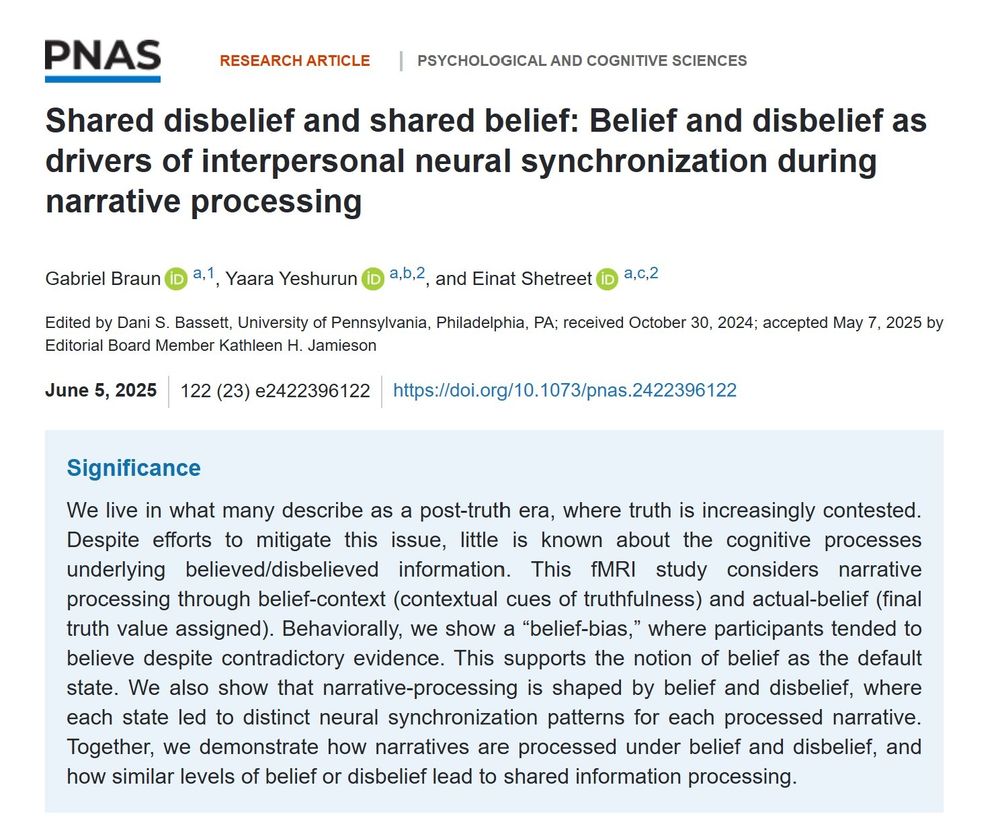
For my first BlueSky post I want to share this freshly published paper in PNAS @pnas.org!
We show how belief and disbelief shape narrative processing in the brain, not just as opposites of a continuum, but as distinct effects, including a cool truth/belief bias.
www.pnas.org/doi/10.1073/...
09.06.2025 18:57 — 👍 7 🔁 1 💬 1 📌 0
Postdoc @vectorinstitute.ai | organizer @queerinai.com | previously MIT, CMU LTI | 🐀 rodent enthusiast | she/they
🌐 https://ryskina.github.io/
Psychologist, but not the kind that can help you
Behavioural Scientist
illusions of truth | behaviour change | meta-science | Registered Reports lover | transparency & openness in research | responsible researcher assessment | 1st gen | she/her 🌱😻
reading and writing about scientific methods, political psychology, digital media, democratic functioning and #VfB.
Tenured researcher at the University of Cologne, formerly Postdoc at the University of Amsterdam. Interested in Bayesian statistics, mathematical models of learning/memory, and computational reproducibility. I develop R packages and obsess about coffee
Researcher of online rumors & disinformation. Former basketball player. Prof at University of Washington, HCDE. Co-founder of the UW Center for an Informed Public. Personal account: Views may not reflect those of my employer. #RageAgainstTheBullshitMachine
Social psychology, judgment & decision-making/behavioral economics, agency, & action. Open/meta science. (Peer Community in) Registered Reports, mass replications, & meta-analyses.
https://mgto.org/resume-cv/
Professor of legal psychology @Uni Marburg, research on deception, deception detection and crime-related memory
Professor of Philosophy, Psychology and Neuroscience at Duke University. Director of the Imagination and Modal Cognition Lab - www.imclab.org. Pun aficionado. (he/him/el) 🇨🇴
Psychological scientist @ CNRS & University of Paris
She/Her. Postdoctoral Research Fellow at NTU.
Interested in all things trust. Open science enthusiast.
🔎 Misinformation, social media & the news 🗞️
🇨🇭 Postdoc at the University of Zurich, previously Reuters Institute & ENS 🇫🇷
Professor in the J-school at the University of Minnesota, studying health and political misinformation
media psychologist | prof at @IWMTue
| interests: knowledge-related (effects of) social media use, ambient awareness, human-machine communication, algorithm acceptance
Misinformation resilience researcher, digital future enthusiast, do-gooder
Author: Verified: How to Think Straight, Get Duped Less, and Make Better Decisions about What to Believe Online (University of Chicago Press).
Researcher, infolit/misinfo/rhetoric/civic reasoning. Currently researching AI as tool for critical thinking.
Statistics lecturer | Freelance statistical consultant & research analyst | #rstats dev @easystats.github.io
home.msbstats.info
(He/Him)
Accidental behavioural economist
koenfucius.substack.com
Postdoctoral Associate @UnivMiami.bsky.social (formerly @UMN & @duke-university.bsky.social) | knowledge revision, trust in science/scientists, source credibility, and science communication https://edpsych.umn.edu/research/labs/reading-learning


